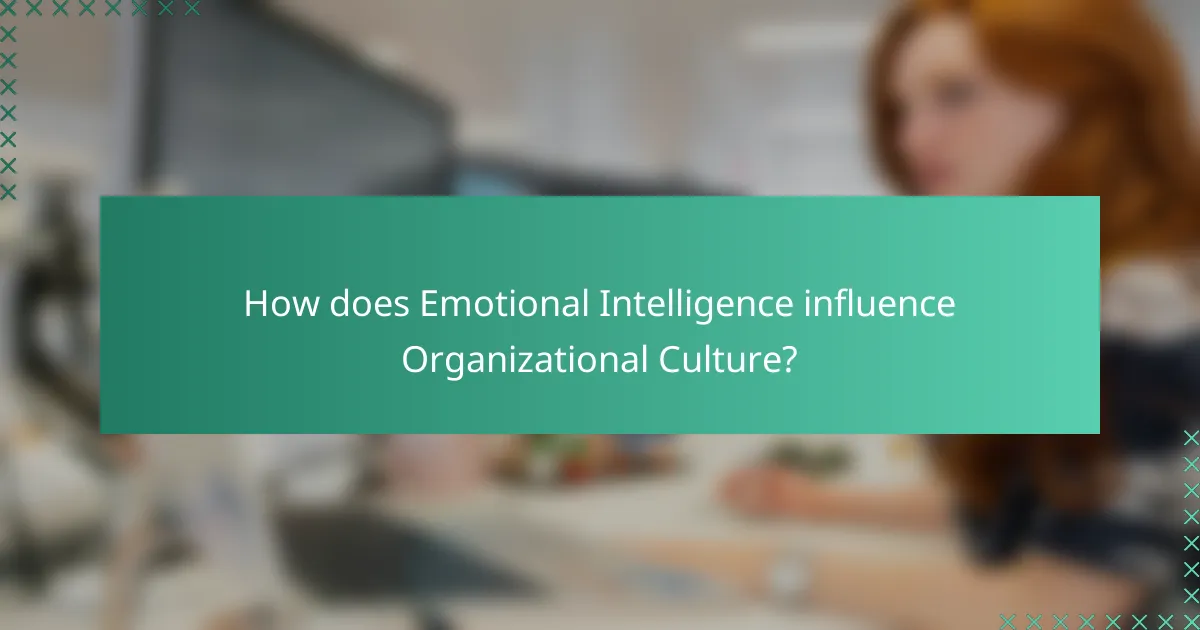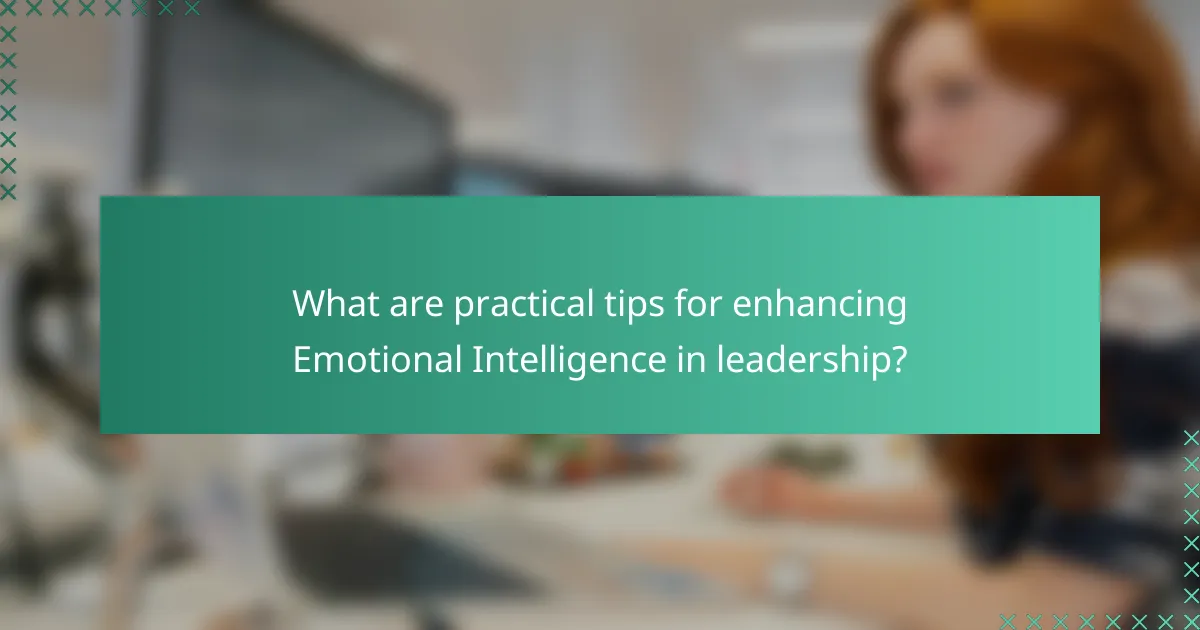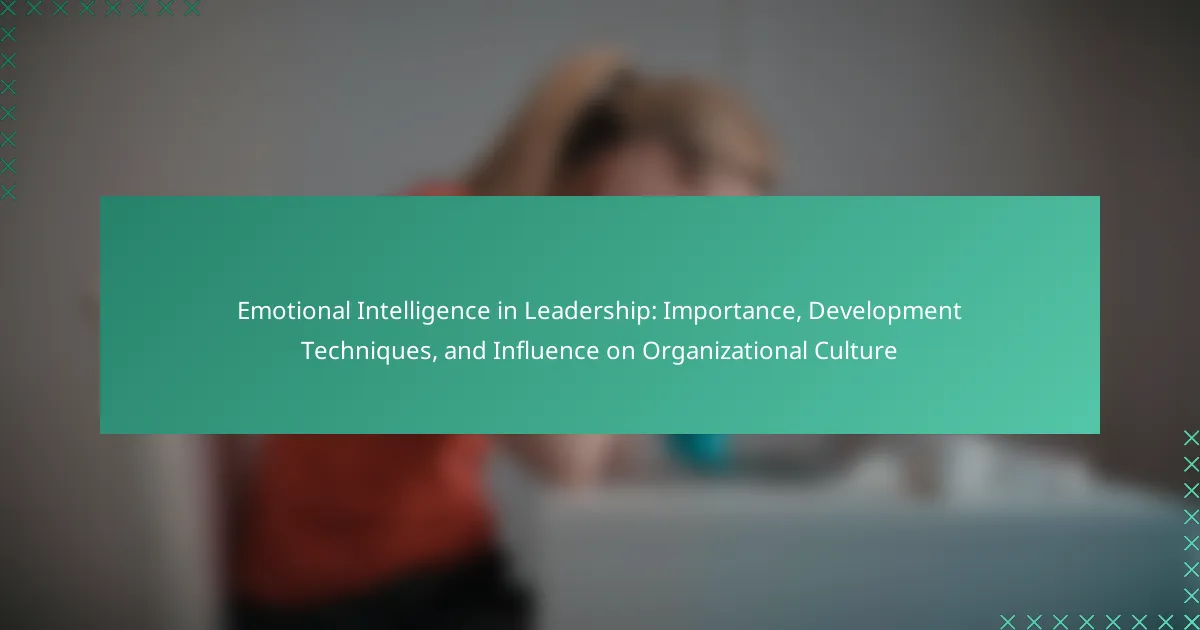Emotional intelligence (EI) in leadership refers to the ability of leaders to recognize, understand, and manage their own emotions, as well as those of their team members. This skill is essential for enhancing decision-making, communication, and conflict resolution, ultimately leading to improved team performance and employee satisfaction. The article examines the significant impact of EI on organizational culture, emphasizing how emotionally intelligent leaders foster trust and collaboration, which in turn boosts employee morale and reduces turnover rates. Additionally, it outlines practical techniques for leaders to enhance their emotional intelligence, such as practicing self-awareness, active listening, empathy, emotional regulation, and continuous learning. By prioritizing EI, organizations can achieve better performance and productivity.

What is Emotional Intelligence in Leadership?
Emotional intelligence in leadership is the ability of leaders to recognize, understand, and manage their own emotions and the emotions of others. This skill enhances decision-making, communication, and conflict resolution. Leaders with high emotional intelligence can empathize with team members. They create a supportive work environment. Research shows that emotionally intelligent leaders improve team performance and employee satisfaction. A study by Goleman et al. highlights that emotional intelligence is crucial for effective leadership. It correlates with better organizational outcomes.
How is Emotional Intelligence defined in the context of leadership?
Emotional Intelligence in leadership is defined as the ability to recognize, understand, and manage one’s own emotions and the emotions of others. This skill enables leaders to foster effective communication and build strong relationships within their teams. Research indicates that leaders with high emotional intelligence can enhance team performance and employee satisfaction. According to a study published in the Journal of Organizational Behavior, emotionally intelligent leaders positively influence workplace culture and employee engagement. This demonstrates that emotional intelligence is a critical component of successful leadership.
What are the key components of Emotional Intelligence?
The key components of Emotional Intelligence are self-awareness, self-regulation, motivation, empathy, and social skills. Self-awareness involves recognizing one’s emotions and their impact on thoughts and behavior. Self-regulation refers to managing emotions and impulses effectively. Motivation is the drive to pursue goals for personal reasons beyond external rewards. Empathy is the ability to understand and share the feelings of others. Social skills encompass managing relationships and building networks. These components are essential for effective leadership and contribute to a positive organizational culture.
How does Emotional Intelligence differ from traditional intelligence?
Emotional Intelligence (EI) differs from traditional intelligence (IQ) in that EI focuses on the ability to recognize, understand, and manage emotions in oneself and others. Traditional intelligence measures cognitive abilities, such as reasoning and problem-solving skills. EI encompasses skills like empathy, emotional regulation, and social awareness. Research indicates that individuals with high EI often excel in leadership roles. For instance, a study by Goleman (1995) highlighted that EI can predict workplace success better than IQ. This demonstrates that EI is crucial for interpersonal relationships and effective communication in organizations.
Why is Emotional Intelligence important for leaders?
Emotional Intelligence is crucial for leaders because it enhances their ability to manage teams effectively. Leaders with high emotional intelligence can recognize and understand their own emotions and those of others. This skill fosters better communication and collaboration within teams. Research shows that emotionally intelligent leaders create more engaged and motivated workforces. According to a study published in the Journal of Organizational Behavior, teams led by emotionally intelligent leaders report higher levels of job satisfaction. Furthermore, emotional intelligence contributes to conflict resolution and stress management. Leaders who can empathize with their team members can address concerns more effectively. This ultimately leads to improved organizational performance and a positive workplace culture.
What impact does Emotional Intelligence have on team dynamics?
Emotional Intelligence significantly enhances team dynamics. It fosters better communication among team members. Teams with high emotional intelligence demonstrate improved collaboration. Members are more empathetic towards each other’s feelings. This leads to increased trust within the team. A study by the Consortium for Research on Emotional Intelligence in Organizations found that emotionally intelligent teams outperform others by 20%. Additionally, high emotional intelligence reduces conflict and promotes a positive work environment. Teams can navigate challenges more effectively with strong emotional awareness.
How does Emotional Intelligence influence decision-making?
Emotional Intelligence (EI) significantly influences decision-making by enhancing self-awareness and empathy. Individuals with high EI can recognize their emotions and understand how these feelings affect their choices. This awareness leads to more informed and rational decisions. Furthermore, EI enables leaders to empathize with others, considering diverse perspectives before making decisions. Research indicates that emotionally intelligent leaders create environments that foster collaboration and trust. A study by Goleman (1998) highlights that EI contributes to better team dynamics and improved problem-solving abilities. Thus, EI serves as a critical factor in effective decision-making within organizations.
What are the benefits of developing Emotional Intelligence in leadership?
Developing Emotional Intelligence in leadership enhances interpersonal relationships and decision-making. Leaders with high emotional intelligence can recognize and manage their own emotions. They can also understand and influence the emotions of others. This skill leads to improved communication and collaboration among team members. Research shows that emotionally intelligent leaders foster a positive work environment. This environment promotes employee engagement and retention. According to a study by the Center for Creative Leadership, leaders with emotional intelligence are more effective in their roles. They achieve better organizational outcomes and drive higher performance levels.
How does Emotional Intelligence contribute to employee engagement?
Emotional Intelligence (EI) enhances employee engagement by fostering better communication and relationships in the workplace. Employees with high EI can understand and manage their emotions effectively. This leads to improved collaboration and teamwork among colleagues. Research shows that organizations with emotionally intelligent leaders experience higher levels of employee satisfaction. A study published in the Journal of Organizational Behavior found that EI is positively correlated with job performance and engagement levels. Additionally, emotionally intelligent leaders can create a supportive work environment. This environment encourages employees to express their ideas and concerns openly. As a result, employees feel valued and more committed to their work.
What role does Emotional Intelligence play in conflict resolution?
Emotional Intelligence (EI) plays a critical role in conflict resolution. EI enables individuals to recognize and understand their own emotions and the emotions of others. This awareness fosters empathy, which is essential for addressing the underlying issues in conflicts. EI skills help leaders to communicate effectively, facilitating open dialogue between conflicting parties. Research shows that leaders with high EI can manage stress and remain calm during disputes. They are more likely to find mutually beneficial solutions. A study published in the Journal of Organizational Behavior found that teams with emotionally intelligent leaders resolved conflicts more efficiently. This highlights the importance of EI in creating a harmonious work environment.
How can leaders develop their Emotional Intelligence?
Leaders can develop their Emotional Intelligence by engaging in self-reflection and seeking feedback. Self-reflection allows leaders to understand their emotions and reactions. Seeking feedback from peers and team members provides external perspectives on their emotional responses. Participating in training programs focused on Emotional Intelligence enhances skills such as empathy and self-regulation. Practicing active listening strengthens interpersonal relationships and improves communication. Additionally, mindfulness practices can help leaders manage stress and enhance emotional awareness. Research indicates that leaders with high Emotional Intelligence positively impact team performance and organizational culture.
What techniques are effective for enhancing self-awareness?
Effective techniques for enhancing self-awareness include mindfulness meditation, journaling, and seeking feedback. Mindfulness meditation helps individuals focus on their thoughts and feelings without judgment. Research shows that consistent practice can improve emotional regulation and self-perception. Journaling encourages reflection on daily experiences and emotions. This practice can reveal patterns in behavior and thought processes. Seeking feedback from others provides external perspectives on one’s actions and impact. Studies indicate that constructive feedback can significantly enhance self-awareness. Together, these techniques promote a deeper understanding of oneself in personal and professional contexts.
How can leaders improve their empathy skills?
Leaders can improve their empathy skills by actively practicing active listening. This involves fully concentrating on what others are saying without interrupting. They should also seek feedback from team members about their emotional responses. Engaging in role-playing exercises can help leaders understand different perspectives. Reading literature that explores diverse human experiences enhances empathy. Mindfulness practices, such as meditation, can increase self-awareness and emotional regulation. Research indicates that leaders with high empathy foster better team cohesion and productivity. Studies show that empathetic leadership leads to higher employee satisfaction and retention rates.
What strategies can be used to foster Emotional Intelligence in teams?
To foster Emotional Intelligence in teams, implement targeted training programs. These programs should focus on self-awareness, empathy, and communication skills. Regular team-building exercises can enhance interpersonal relationships. Encouraging open feedback promotes a culture of trust and understanding. Additionally, leaders should model emotionally intelligent behaviors. Providing resources, such as workshops and coaching, supports ongoing development. Research indicates that organizations with high emotional intelligence report better team performance and employee satisfaction. A study by Goleman (1995) highlights the correlation between emotional intelligence and effective leadership.
How can training programs enhance Emotional Intelligence within organizations?
Training programs can enhance Emotional Intelligence (EI) within organizations by providing structured learning opportunities. These programs focus on developing self-awareness, self-regulation, empathy, and social skills. Participants engage in activities that promote understanding of their emotions and the emotions of others. Role-playing and group discussions are common techniques used in these programs. Research shows that organizations with higher EI levels report better teamwork and communication. A study by Cherniss and Goleman (2001) found that EI training improved workplace performance. Enhanced EI leads to improved leadership effectiveness and employee satisfaction.
What role does feedback play in developing Emotional Intelligence?
Feedback is crucial in developing Emotional Intelligence (EI). It provides individuals with insights into their emotional responses and behaviors. Constructive feedback helps identify strengths and areas for improvement. This process enhances self-awareness, a key component of EI. Research shows that individuals who receive regular feedback improve their emotional regulation skills. According to a study by Goleman et al. (2013), feedback facilitates personal growth and emotional understanding. This growth leads to better interpersonal relationships and communication. Ultimately, effective feedback fosters a more emotionally intelligent leadership style.

How does Emotional Intelligence influence Organizational Culture?
Emotional Intelligence (EI) significantly influences Organizational Culture by shaping interpersonal relationships and communication within the workplace. High EI in leaders fosters an environment of trust and collaboration. This leads to improved employee morale and engagement. Research shows that organizations with emotionally intelligent leadership experience lower turnover rates. A study by Goleman (1998) highlights that EI contributes to effective conflict resolution. Consequently, teams with high EI are more adaptable to change and innovation. Organizations that prioritize EI in their culture often report enhanced performance and productivity. Thus, EI is a crucial factor in developing a positive organizational culture.
What is the relationship between Emotional Intelligence and organizational culture?
Emotional Intelligence (EI) significantly influences organizational culture. EI enhances communication and collaboration among employees. High EI fosters an environment of trust and empathy. This leads to improved teamwork and conflict resolution. Organizations with strong EI are more adaptable to change. Research shows that companies with high EI cultures experience lower turnover rates. A study by Goleman (1998) highlights the link between EI and effective leadership. Leaders with high EI create a positive organizational culture, driving performance and employee satisfaction.
How can Emotional Intelligence shape workplace values and norms?
Emotional Intelligence shapes workplace values and norms by enhancing interpersonal relationships and communication. It fosters empathy and understanding among team members. This leads to a collaborative environment where individuals feel valued. Research indicates that organizations with high emotional intelligence report improved employee satisfaction. A study by Goleman (1995) highlights that emotionally intelligent leaders create a positive organizational culture. This culture encourages open feedback and trust. As a result, shared values and norms are established, promoting a sense of belonging. Effective emotional intelligence practices can ultimately drive organizational success and resilience.
What are the signs of a culture influenced by high Emotional Intelligence?
A culture influenced by high Emotional Intelligence exhibits several key signs. These include open communication, where team members feel safe to express their thoughts. Empathy is prevalent, leading to better understanding among colleagues. Conflict resolution is handled constructively, minimizing negativity. Collaboration is prioritized, with a focus on collective goals. Feedback is given and received positively, fostering growth. Emotional awareness is high, allowing individuals to manage their feelings effectively. Trust is built among team members, enhancing relationships. Overall, these signs contribute to a supportive and productive work environment.
How can leaders use Emotional Intelligence to drive cultural change?
Leaders can use Emotional Intelligence (EI) to drive cultural change by enhancing communication and fostering trust. EI enables leaders to recognize and understand their own emotions and those of others. This awareness allows leaders to connect with their teams on a deeper level. By modeling emotional regulation, leaders create an environment where employees feel safe to express their thoughts and feelings.
Research shows that organizations with high EI leadership experience lower turnover rates and increased employee engagement. A study by Goleman (1998) highlights that emotionally intelligent leaders can inspire and motivate their teams effectively. Through active listening and empathy, leaders can address concerns and adapt to the needs of their workforce.
Additionally, EI helps leaders navigate conflict and promote collaboration. By leveraging emotional insights, leaders can align team goals with organizational values. This alignment fosters a shared sense of purpose, driving cultural change. Overall, leaders who utilize EI can create a positive workplace culture that supports transformation.
What approaches can leaders take to align Emotional Intelligence with organizational goals?
Leaders can align Emotional Intelligence (EI) with organizational goals through several strategic approaches. First, they should integrate EI training into professional development programs. This enhances employees’ self-awareness and interpersonal skills, crucial for achieving organizational objectives. Second, leaders must model EI behaviors themselves. Demonstrating empathy, active listening, and emotional regulation sets a standard for the team. Third, leaders can establish a feedback-rich culture. Regular feedback helps employees understand their emotional impact on others and fosters continuous improvement.
Additionally, leaders should align EI with performance metrics. Incorporating EI into performance evaluations emphasizes its importance in achieving organizational goals. Furthermore, leaders can create cross-functional teams. This encourages diverse perspectives and enhances collective emotional intelligence. Finally, recognizing and rewarding EI contributions reinforces its value within the organization. These approaches collectively enhance organizational culture and drive alignment with goals.
How can leaders model Emotional Intelligence to inspire others?
Leaders can model Emotional Intelligence (EI) by demonstrating self-awareness, empathy, and effective communication. Self-awareness allows leaders to understand their emotions and how they affect others. This understanding fosters a positive work environment. Empathy enables leaders to connect with team members on a personal level. It encourages trust and collaboration within the team. Effective communication involves active listening and clear expression of thoughts. This helps in resolving conflicts and building strong relationships.
Research indicates that leaders with high EI create more engaged teams. A study by Goleman et al. (2002) found that emotionally intelligent leaders are more successful in inspiring and motivating their teams. Additionally, organizations with emotionally intelligent leadership report improved employee satisfaction and retention. Thus, by embodying these traits, leaders can effectively inspire others.
What challenges might leaders face in implementing Emotional Intelligence in their culture?
Leaders may face several challenges in implementing Emotional Intelligence (EI) in their culture. Resistance to change is a significant barrier. Employees may be accustomed to traditional leadership styles. This can lead to skepticism about the benefits of EI. Training and development resources may be limited. Leaders might struggle to find effective programs to enhance EI skills. Measuring the impact of EI on performance can be difficult. There is often a lack of clear metrics to assess progress. Additionally, leaders themselves may lack EI skills. This can hinder their ability to model desired behaviors. Organizational culture may not support emotional awareness. A culture focused solely on results may overlook the importance of emotions. Finally, time constraints can impede the integration of EI training. Leaders often prioritize immediate tasks over long-term cultural shifts.
How can leaders overcome resistance to Emotional Intelligence initiatives?
Leaders can overcome resistance to Emotional Intelligence initiatives by fostering a culture of openness and trust. They should communicate the benefits of Emotional Intelligence clearly to all team members. Providing training sessions can help employees understand its value. Engaging employees in discussions about their concerns can reduce resistance. Leaders should model Emotional Intelligence behaviors themselves to set an example. Recognizing and rewarding positive Emotional Intelligence practices can encourage adoption. Research shows that organizations with high Emotional Intelligence see improved employee engagement and performance. For instance, a study by the Consortium for Research on Emotional Intelligence in Organizations found that Emotional Intelligence competencies are linked to better leadership effectiveness.
What are common misconceptions about Emotional Intelligence in leadership?
One common misconception about Emotional Intelligence (EI) in leadership is that it solely involves being nice or empathetic. EI encompasses a range of skills, including self-awareness and self-regulation. Many believe that high EI leaders will always prioritize emotions over tasks. However, effective leaders balance emotional insight with decision-making. Another misconception is that EI cannot be developed. Research indicates that EI can improve through training and practice. Additionally, some think that EI is irrelevant in high-pressure environments. In fact, leaders with high EI often excel in stress management. These misconceptions can undermine the true value of EI in fostering effective leadership.

What are practical tips for enhancing Emotional Intelligence in leadership?
Enhancing Emotional Intelligence in leadership involves several practical tips. First, leaders should practice self-awareness. This means recognizing their own emotions and how these affect their behavior. Second, active listening is crucial. Leaders must listen to their team members without interrupting. This fosters trust and open communication.
Third, empathy is essential. Leaders should strive to understand others’ perspectives and feelings. This builds stronger relationships within the team. Fourth, leaders should manage their emotions effectively. This includes staying calm under pressure and responding thoughtfully.
Fifth, providing constructive feedback can enhance team dynamics. Leaders should focus on specific behaviors rather than personal attributes. Finally, continuous learning is vital. Engaging in workshops or training on emotional intelligence can further develop these skills. Research shows that leaders with high emotional intelligence positively impact team performance and organizational culture.
How can leaders consistently practice Emotional Intelligence skills?
Leaders can consistently practice Emotional Intelligence skills by engaging in self-awareness, self-regulation, social awareness, and relationship management. Self-awareness involves recognizing one’s emotions and their impact on others. Leaders can enhance this by reflecting on their emotional responses in various situations. Self-regulation allows leaders to manage their emotions effectively. Techniques such as mindfulness can help leaders maintain control in stressful situations. Social awareness enables leaders to empathize with team members. Regularly seeking feedback from peers and subordinates can improve this skill. Relationship management focuses on building strong interpersonal connections. Leaders can practice this by actively listening and resolving conflicts constructively. Research shows that leaders with high Emotional Intelligence positively influence team performance and satisfaction.
What daily habits can support the development of Emotional Intelligence?
Practicing self-reflection daily can support the development of Emotional Intelligence. Self-reflection helps individuals understand their emotions and reactions. Journaling about daily experiences encourages deeper insights into feelings. Mindfulness meditation can enhance awareness of emotional states. Engaging in active listening during conversations fosters empathy. Seeking feedback from peers or mentors provides external perspectives on emotional responses. Setting aside time for emotional check-ins promotes emotional regulation. Regularly reading literature on emotional intelligence deepens knowledge and application of concepts. These habits collectively contribute to improved emotional intelligence over time.
How can leaders create a supportive environment for Emotional Intelligence growth?
Leaders can create a supportive environment for Emotional Intelligence (EI) growth by fostering open communication. Encouraging dialogue allows team members to express their emotions and thoughts freely. This practice builds trust among team members. Additionally, leaders should model emotional awareness and regulation. When leaders demonstrate EI, they set a standard for the team. Providing training and resources on EI enhances understanding and skills. Research indicates that organizations with EI training report improved employee performance and satisfaction. Creating a feedback-rich culture also supports EI development. Regular, constructive feedback helps individuals recognize their emotional strengths and areas for improvement.
Emotional Intelligence in Leadership is defined as the ability of leaders to recognize, understand, and manage their own emotions and those of others, which significantly impacts decision-making, communication, and team dynamics. The article explores the key components of emotional intelligence, including self-awareness, empathy, and social skills, and highlights its importance in fostering a positive organizational culture and enhancing employee engagement. Additionally, it discusses practical techniques for developing emotional intelligence in leaders and teams, as well as the challenges and misconceptions surrounding its implementation in the workplace. Overall, the article emphasizes the critical role of emotional intelligence in driving effective leadership and organizational success.
